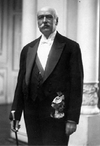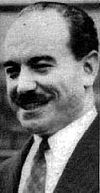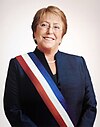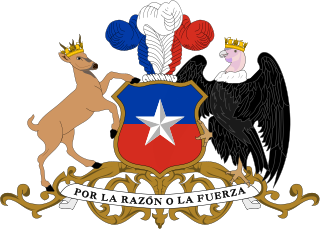
The President of Ireland is the head of state of Ireland and the Supreme Commander of the Irish Defence Forces.
A military dictatorship, also known as a military junta, is a dictatorship wherein the military exerts complete or substantial control over political authority, and a dictator is often a high ranked military officer.

The President of Argentina, officially known as the President of the Argentine Nation, is both head of state and head of government of Argentina. Under the national Constitution, the President is also the chief executive of the federal government and Commander-in-Chief of the armed forces.

The President of the Council of Ministers of the Italian Republic, commonly referred to in Italy as Presidente del Consiglio, or informally as Premier and known in English as the Prime Minister of Italy, is the head of government of the Italian Republic. The office of Prime Minister is established by Articles 92 through to 96 of the Constitution of Italy. The Prime Minister is appointed by the President of the Republic after each general election and must have the confidence of the Italian Parliament to stay in office.

The Senate of the Republic of Chile is the upper house of Chile's bicameral National Congress, as established in the current Constitution of Chile.

The 1973 Chilean coup d'état was a watershed moment in both the history of Chile and the Cold War. Following an extended period of social unrest and political tension between the opposition-controlled Congress of Chile and the socialist President Salvador Allende, as well as economic warfare ordered by US President Richard Nixon, Allende was overthrown by the armed forces and national police.

Arturo Fortunato Alessandri Palma, GCTE was a Chilean political figure and reformer, who served thrice as the President of Chile, first between 1920 and 1924, then for part of 1925, and finally from 1932 until 1938.

José Toribio Merino Castro was a Chilean admiral who was one of the principal leaders of the 1973 Chilean coup d'état, along with General Augusto Pinochet of the Army, General Gustavo Leigh of the Air Force, and General César Mendoza of the Carabineros. Together they established a military government that ruled Chile from 1973 until 1990.

The Vice President of the Philippines is the second-highest executive official of the government of the Philippines, after the President. The Vice President currently holds office at the Quezon City Reception House in Quezon City. Previously, the Vice President of the Philippines held office at the Coconut Palace, the Philippine National Bank Financial Center, and the Philippine International Convention Center, all in Pasay, Metro Manila.
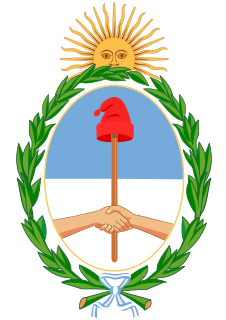
The Constitution of Argentina is the basic governing document of Argentina, and the primary source of existing law in Argentina. Its first version was written in 1853 by a Constitutional Assembly gathered in Santa Fe, and the doctrinal basis was taken in part from the United States Constitution. It was then reformed in 1860, 1866, 1898, 1949, 1957, and the current version is the reformed text of 1994.

A parliamentary republic is a republic that operates under a parliamentary system of government where the executive branch derives its legitimacy from and is accountable to the legislature. There are a number of variations of parliamentary republics. Most have a clear differentiation between the head of government and the head of state, with the head of government holding real power, much like constitutional monarchies. Some have combined the roles of head of state and head of government, much like presidential systems, but with a dependency upon parliamentary power.
The 2006 Thai interim civilian government is the Thai provisional civilian government headed by Interim Prime Minister General Surayud Chulanont. It was appointed on 1 October 2006 by the Council for National Security, the initial post-coup interim military government led by General Sonthi Boonyaratglin, which had overthrown the government of Thaksin Shinawatra in a coup on 19 September 2006. The interim government operated under an interim constitution, promulgated that same day.

The Ministry of the Interior and Public Security is the cabinet-level office of home affairs in Chile, in charge of "maintaining public order, security and social peace" within the country. It is also charged with planning, directing, coordinating, executing, controlling, and informing the domestic policies formulated by the President of Chile. As responsible for local government, the minister supervises all non-elected regional authorities.
Myint Swe is a Burmese politician, currently serving as 3rd First Vice President of the Republic of Union of Myanmar (Burma). He previously served as Acting President of Myanmar after the resignation of President Htin Kyaw on 21 March 2018. He also served as Chief Minister of Yangon Region from 30 March 2011 to 30 March 2016. On 30 March 2016, he was sworn in as the Vice President of Myanmar. He is an ethnic Mon ex-military officer in Myanmar Army with the rank of Lieutenant general.

Augusto José Ramón Pinochet Ugarte was a Chilean general, politician and dictator of Chile between 1973 and 1990 who remained the Commander-in-Chief of the Chilean Army until 1998 and was also President of the Government Junta of Chile between 1973 and 1981.

Gregorio Funes, also known as Deán Funes, was an Argentine clergyman, educator, historian, journalist and lawmaker who played a significant role in his nation's early, post-independence history.

The Ministry of Defence of the Republic of Indonesia, formerly the Department of Defence of the Republic of Indonesia is a government ministry responsible for the defence affairs of Indonesia. The minister is currently Ryamizard Ryacudu since 27 October 2014.

The President of the People's Republic of China is the head of state of the People's Republic of China. Under the country's constitution, the presidency is a largely ceremonial office with limited powers. However, since 1993, as a matter of convention, the presidency has been held simultaneously by the General Secretary of the Communist Party of China, the top leader in the one party system. The presidency is officially regarded as an institution of the state rather than an administrative post; theoretically, the President serves at the pleasure of the National People's Congress, the legislature, and is not legally vested to take executive action on its own prerogative. The current President is Xi Jinping, who took presidency in March 2013.












































